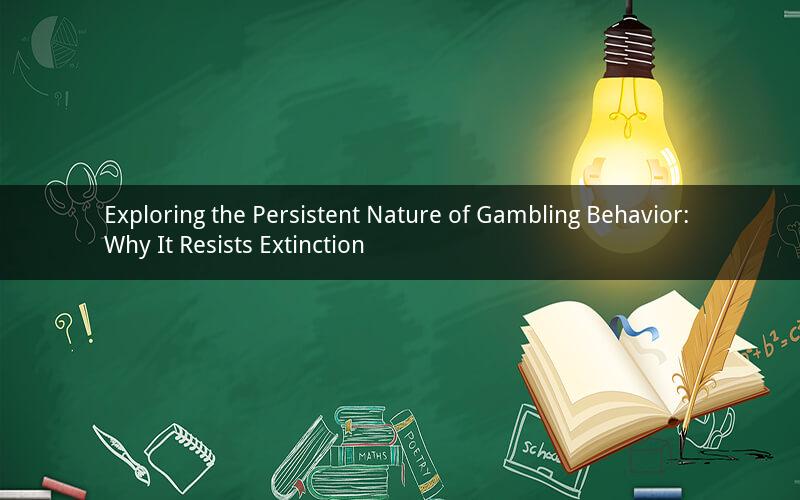
Gambling behavior has been a topic of great interest for researchers and psychologists alike. Despite numerous efforts to curb this habit, it remains a persistent issue for many individuals. This article delves into the reasons behind the resistance of gambling behavior to extinction, offering insights into the psychological, social, and environmental factors that contribute to its endurance.
I. Psychological Factors
A. The Thrill of Risk
One of the primary reasons why gambling behavior resists extinction is the thrill of risk. The prospect of winning big and the adrenaline rush that comes with it create a powerful incentive for individuals to continue engaging in gambling activities. This psychological aspect makes it challenging for individuals to break free from the cycle of gambling addiction.
B. Cognitive Biases
Cognitive biases, such as the overestimation of winning chances and the availability heuristic, play a significant role in sustaining gambling behavior. These biases lead individuals to believe that they have a higher probability of winning than they actually do, making it difficult for them to recognize the risks associated with gambling.
C. Emotional Regulation
Gambling often serves as a means of emotional regulation for individuals. The act of gambling can provide a temporary escape from stress, anxiety, or boredom, making it an appealing coping mechanism. This emotional connection to gambling makes it difficult for individuals to extinguish this behavior.
II. Social Factors
A. Peer Influence
Social factors, such as peer influence, can also contribute to the persistence of gambling behavior. Individuals may be more likely to engage in gambling activities if they perceive their peers as doing so. This social pressure can make it challenging for individuals to resist the temptation to participate in gambling.
B. Media Representation
The portrayal of gambling in the media, particularly in movies and advertisements, can create unrealistic expectations about the ease of winning and the excitement of gambling. This representation can further reinforce the allure of gambling, making it harder for individuals to resist its allure.
III. Environmental Factors
A. Accessibility of Gambling Facilities
The accessibility of gambling facilities plays a crucial role in sustaining gambling behavior. With the proliferation of online gambling platforms and the presence of casinos in various locations, individuals have easy access to gambling opportunities. This accessibility makes it more challenging for individuals to break away from the habit.
B. Marketing Strategies
Marketing strategies employed by gambling industries are designed to attract and retain customers. These strategies often target individuals who are more susceptible to gambling addiction, making it difficult for them to resist the诱惑.
IV. Treatment and Intervention
A. Understanding the Complexity of Gambling Addiction
Treating gambling addiction requires a comprehensive approach that acknowledges the complexity of the issue. Understanding the various factors contributing to gambling behavior is essential for developing effective treatment and intervention strategies.
B. Combating Cognitive Biases
Educational programs aimed at combating cognitive biases associated with gambling can be beneficial. By helping individuals recognize the risks and probabilities involved in gambling, these programs can empower them to make more informed decisions.
C. Social Support and Intervention
Support from family, friends, and professionals is crucial in helping individuals overcome gambling addiction. Social interventions, such as support groups and counseling, can provide individuals with the tools and resources needed to resist the allure of gambling.
Questions and Answers:
1. How can individuals recognize the signs of gambling addiction?
Individuals can recognize the signs of gambling addiction by observing changes in their behavior, finances, and relationships. Common signs include hiding gambling activities, borrowing money to gamble, and experiencing negative consequences due to gambling.
2. What role does therapy play in treating gambling addiction?
Therapy plays a vital role in treating gambling addiction by addressing the underlying psychological and emotional factors contributing to the addiction. Therapists can help individuals develop healthier coping mechanisms and improve their overall well-being.
3. Can online gambling be as addictive as traditional gambling?
Yes, online gambling can be as addictive as traditional gambling. The convenience and accessibility of online platforms make it easier for individuals to engage in gambling activities, potentially leading to addiction.
4. How can governments and organizations combat gambling addiction?
Governments and organizations can combat gambling addiction by implementing stricter regulations on gambling industries, providing education and resources for individuals at risk, and promoting responsible gambling practices.
5. Is there a genetic component to gambling addiction?
Research suggests that there may be a genetic component to gambling addiction. However, it is important to note that genetics alone do not determine whether an individual will develop a gambling addiction; environmental and psychological factors also play a significant role.